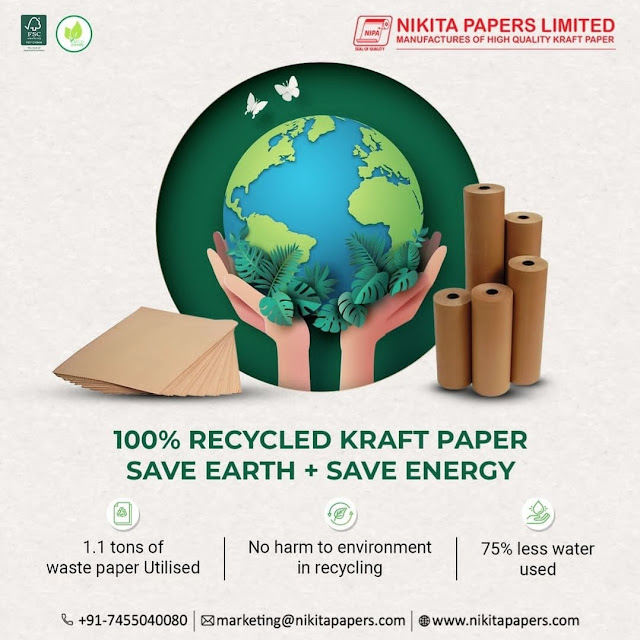Revolutionary Trends In Paper Manufacturing: Shaping A Sustainable Future
India's paper market is experiencing unprecedented growth, outpacing the rest of the world. This remarkable expansion is driven by the anticipation of increased paper consumption in line with economic progress. Looking ahead, it's projected that paper consumption will scale multiple times in comparison to GDP, translating to a one-million-ton demand increase for every one-kilogram growth in individual consumption. To meet this soaring demand, India's paper industry is actively pursuing innovation and advancement. High-quality Kraft Paper, renowned for its versatility in industrial and packaging applications, is emerging as a highly sought-after commodity. Leading this transformation are eco-friendly paper manufacturers, committed to sustainable production practices and responsible sourcing of raw materials. Additionally, recycled kraft paper manufacturers play a pivotal role in reducing environmental impact by reusing materials, further contributing to the green revolution of the Indian paper sector
Recent Advances In Paper Manufacturing
1. Sustainable Sourcing: Prioritizing Environmental Responsibility
Sustainability
is a paramount concern within the paper manufacturing sector. Traditionally,
paper production raised deforestation and environmental damage concerns.
However, the industry is making significant strides in adopting responsible
sourcing practices. In 2020, global sustainable paper production reached 53.3%,
signifying a strong commitment to eco-friendly processes.
Among
the most fascinating advancements in paper manufacturing is the incorporation
of nanotechnology. Nanocellulose, derived from wood pulp, takes centre stage in
this domain. It bolsters paper's structural integrity while preserving its
lightweight nature, making it a preferred choice for innovative packaging
materials. Beyond this, nanotechnology's applications extend to the creation of
paper-based sensors, serving various purposes like environmental monitoring and
healthcare.
The
proliferation of digital printing has profoundly transformed paper
manufacturing. This innovation facilitates the production of customized,
on-demand materials. Statistics indicate that digital printing contributes
significantly to the industry's growth, with an expected compound annual growth
rate of 6.2% between 2021 and 2026.
Paper's
inherent susceptibility to moisture and other environmental factors has long
posed a challenge. In response, the industry has introduced advanced barrier
coatings that fortify paper against these elements. This development has
broadened the utility of paper in packaging materials, reducing dependence on
less eco-friendly alternatives like plastic.
The
paper industry is increasingly embracing the principles of the circular
economy, advocating for the recycling and reuse of paper products. In the
United States, the paper recycling rate stood impressively at 66.2% in 2019.
The adoption of closed-loop systems and improved recycling infrastructure is
significantly reducing the environmental footprint of paper production.
Innovations
in paper manufacturing are not limited to two-dimensional applications.
Researchers and industry leaders are exploring the exciting realm of 3D
printing using paper pulp. This eco-friendly alternative to traditional plastic
3D printing materials has garnered substantial interest, offering a sustainable
avenue for creative production.
7. Blockchain for Transparency: Enhancing Accountability
In
an age of heightened consumer awareness, the paper industry is leveraging
blockchain technology to bolster transparency within the supply chain.
Blockchain delivers real-time information about the origin of paper products,
ensuring they meet sustainability and ethical standards.
The
paper manufacturing industry is steadfast in its commitment to reducing its
environmental impact. Significant investments have been directed towards
energy-efficient technologies and the reduction of greenhouse gas emissions.
The numbers reveal encouraging progress, with global paper industry carbon
emissions having decreased by approximately 15% since 2005.
Takeaway
The paper manufacturing industry has evolved from its historical image as an environmentally taxing sector. These innovations underscore its adaptability and commitment to sustainability, efficiency, and versatility, aligning with the evolving demands of the modern world. As both consumers and businesses increasingly prioritize eco-friendly solutions, the paper industry's enduring dedication to innovation paints a promising picture of a sustainable and vibrant future.

.jpg)

Comments
Post a Comment